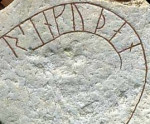The Illyrians were a group of Indo-European tribes, who once inhabited western Balkans.
Starting from the 2nd century AD the Illyrians were gradually wiped off from the map; and The Illyrians were mentioned for the last time in the 7th century. With the disintegration of the Roman Empire, Gothic and Hunnic tribes raided the Balkan peninsula, forcing many Illyrians to seek refuge in the highlands. With the arrival of the Slavs in the 6th century, most Illyrians were Slavicized.
Follow the link to see where the Illyrians once lived.
Links:
- Illyrian languages on the map. To see the Illyrian populated areas, switch the map base layer to ‘political boundaries’.


